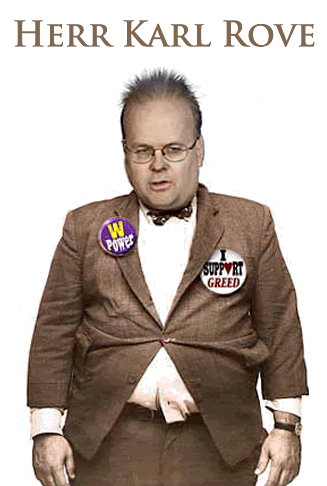kwc blog: Why Bush avoids press conferencesQUESTION: Mr. President, why are you and the vice president insisting on appearing together before the 9-11 commission? And, Mr. President, who will we be handing the Iraqi government over to on June 30th?
BUSH: We'll find that out soon. That's what Mr. Brahimi is doing. He's figuring out the nature of the entity we'll be handing sovereignty over.
And, secondly, because the 9-11 commission wants to ask us questions, that's why we're meeting. And I look forward to meeting with them and answering their questions.
QUESTION: (OFF-MIKE) I was asking why you're appearing together, rather than separately, which was their request.
BUSH: Because it's a good chance for both of us to answer questions that the 9-11 commission is looking forward to asking us. And I'm looking forward to answering them.
QUESTION: In the last campaign, you were asked a question about the biggest mistake you'd made in your life, and you used to like to joke that it was trading Sammy Sosa.
You've looked back before 9-11 for what mistakes might have been made. After 9-11, what would your biggest mistake be, would you say, and what lessons have learned from it?
BUSH: I wish you'd have given me this written question ahead of time so I could plan for it.
John, I'm sure historians will look back and say, gosh, he could've done it better this way or that way. You know, I just -- I'm sure something will pop into my head here in the midst of this press conference, with all the pressure of trying to come up with answer, but it hadn't yet.
I would've gone into Afghanistan the way we went into Afghanistan. Even knowing what I know today about the stockpiles of weapons, I still would've called upon the world to deal with Saddam Hussein.
See, I'm of the belief that we'll find out the truth on the weapons. That's why we sent up the independent commission. I look forward to hearing the truth as to exactly where they are. They could still be there. They could be hidden, like the 50 tons of mustard gas in a turkey farm.
One of the things that Charlie Duelfer talked about was that he was surprised of the level of intimidation he found amongst people who should know about weapons and their fear of talking about them because they don't want to be killed.
You know, there's this kind of -- there's a terror still in the soul of some of the people in Iraq.
They're worried about getting killed, and therefore they're not going to talk. But it'll all settle out, John. We'll find out the truth about the weapons at some point in time.
However, the fact that he had the capacity to make them bothers me today just like it would have bothered me then. He's a dangerous man. He's a man who actually not only had weapons of mass destruction -- the reason I can say that with certainty is because he used them.
And I have no doubt in my mind that he would like to have inflicted harm, or paid people to inflict harm, or trained people to inflict harm, on America, because he hated us.
I hope -- I don't want to sound like I have made no mistakes. I'm confident I have. I just haven't -- you just put me under the spot here, and maybe I'm not as quick on my feet as I should be in coming up with one.
QUESTION: Following on both Judy and John's questions, and it comes out of what you just said in some ways, with public support for your policies in Iraq falling off the way they have, quite significantly over the past couple of months, I guess I'd like to know if you feel, in any way, that you have failed as a communicator on this topic.
BUSH: Gosh, I don't know. I mean ...
QUESTION: Well, you deliver a lot of speeches, and a lot of them contain similar phrases and may vary very little from one to the next. And they often include a pretty upbeat assessment of how things are going, with the exception of tonight. It's pretty somber.
BUSH: A pretty somber assessment today, Don, yes.
QUESTION: But I guess I just wonder if you feel that you have failed in any way. You don't have many of these press conferences where you engage in this kind of exchange. Have you failed in any way to really make the case to the American public?
BUSH: You know, that's, I guess, if you put it into a political context, that's the kind of thing the voters will decide next November. That's what elections are about. They'll take a look at me and my opponent and say, let's see, which one of them can better win the war on terror? Who best can see to it that Iraq emerges a free society?
And, Don, you know, if I tried to fine-tune my messages based upon polls, I think I'd be pretty ineffective. I know I would be disappointed in myself.
I hope today you've got a sense of my conviction about what we're doing. If you don't, maybe I need to learn to communicate better...
